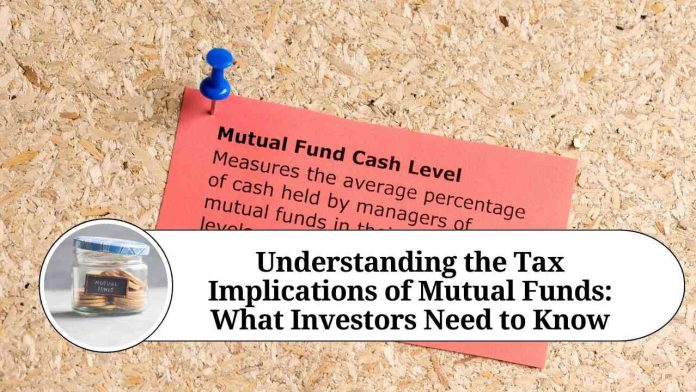ITRODUCTION
Mutual funds have become a popular investment option for individuals looking to grow their wealth over time. While they offer many benefits, such as diversification and professional management, investors may have questions about the tax implications of investing in mutual funds. In this blog, we will answer the question: Are mutual funds taxable?
Firstly, it’s essential to understand that mutual funds are subject to taxation. The tax treatment of mutual funds is governed by the Internal Revenue Service (IRS) in the United States. The tax implications of mutual funds depend on several factors, such as the type of mutual fund, the holding period, and the investor’s tax bracket.
One of the primary ways that mutual funds generate income is through capital gains. Capital gains are profits made from selling an asset that has increased in value. Mutual funds earn capital gains by selling securities at a profit. When a mutual fund sells securities at a profit, it distributes the gains to its shareholders in the form of a capital gains distribution. These distributions are subject to taxation.
The tax rate on capital gains depends on the holding period. If an investor holds a mutual fund for more than one year before selling it, they are eligible for the long-term capital gains tax rate. The long-term capital gains tax rate is generally lower than the short-term capital gains tax rate, which applies to securities held for less than one year.
Another way that mutual funds generate income is through dividends. Dividends are payments made by a company to its shareholders. Mutual funds that invest in dividend-paying stocks earn income from these payments, which is then distributed to the mutual fund’s shareholders. Dividends are also subject to taxation.
The tax rate on dividends depends on several factors, such as the investor’s tax bracket and the type of dividend. Qualified dividends are taxed at the long-term capital gains tax rate, while non-qualified dividends are taxed at the investor’s ordinary income tax rate.
In addition to capital gains and dividends, mutual funds may also generate income from interest, which is taxable at the investor’s ordinary income tax rate.
To further expand on the tax implications of mutual funds, it’s important to note that there are different types of mutual funds that may have varying tax consequences. For example, index funds are generally more tax-efficient than actively managed funds. This is because index funds have lower turnover rates, meaning they buy and sell securities less frequently, which results in fewer capital gains distributions.
On the other hand, actively managed funds may have higher turnover rates, resulting in more frequent capital gains distributions. It’s also important to note that mutual funds held in tax-deferred accounts, such as Individual Retirement Accounts (IRAs) or 401(k) plans, are not subject to immediate taxation. However, investors will eventually have to pay taxes on distributions when they withdraw funds from these accounts.
Investors who hold mutual funds in taxable accounts should be aware of the tax consequences of selling shares. Selling mutual fund shares for a profit will result in capital gains, while selling shares at a loss may result in a capital loss, which can be used to offset capital gains or up to $3,000 of ordinary income per year.
It’s also worth noting that mutual fund companies are required to provide investors with information on the tax implications of their investments. This includes information on capital gains distributions and dividends, as well as tools to help investors estimate their tax liabilities.
Another important factor to consider when it comes to the tax implications of mutual funds is the concept of “wash sales.” A wash sale occurs when an investor sells shares of a mutual fund or other security at a loss and then repurchases the same security within 30 days before or after the sale. In this scenario, the loss is disallowed for tax purposes.
To avoid a wash sale, investors can wait at least 31 days before repurchasing the same security. Alternatively, they can purchase a similar but not identical security to maintain their desired asset allocation while avoiding the wash sale rule.
It’s also worth noting that mutual funds can have different tax implications for different types of investors. For example, tax-exempt mutual funds may be more beneficial for investors in higher tax brackets, while taxable mutual funds may be more advantageous for investors in lower tax brackets.
Lastly, it’s important for investors to understand the difference between a mutual fund’s net asset value (NAV) and its market price. The NAV is the value of the mutual fund’s assets minus its liabilities, divided by the number of outstanding shares. The market price is the price at which shares of the mutual fund are traded on an exchange.
When an investor purchases shares of a mutual fund, they typically pay the NAV plus any applicable sales charges or fees. When they sell shares, they receive the NAV minus any applicable redemption fees. However, if they sell shares at a market price that is higher than the NAV, they may be subject to capital gains taxes on the difference.
Conclusion
Mutual funds are subject to taxation, and investors should consider the tax implications of their mutual fund investments when making investment decisions. By understanding the tax consequences of investing in mutual funds, investors can make informed decisions that align with their long-term financial goals and minimize their tax liabilities.
Other Related Blogs: Section 144B Income Tax Act




















